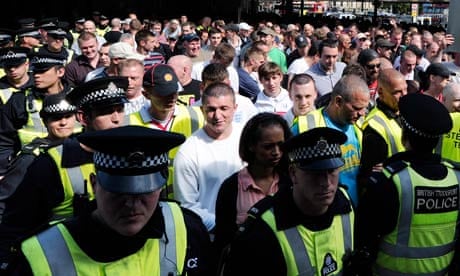Huge crowds are assembling before a planned demonstration by the English Defence League (EDL) in east London, vowing to defend the community from the far-right group.
Amid a police presence of around 3,000 officers, hundreds of residents and anti-fascist campaigners converged along Whitechapel Road close to the East London mosque, a self-proclaimed target for some members of the EDL. Muslims accuse the group of fostering hate against them.
At around 1.20pm, staff at King's Cross station closed the entrance to the tube, preventing the majority of the EDL supporters gathered outside from travelling to the demonstration around Aldgate East tube for around half an hour.
The EDL supporters then made their way towards Aldgate East, and police said they expected around 1,000 would attend the protest.
Earlier, the RMT train drivers' union said it would shut down Liverpool Street station on health and safety grounds if the EDL gathered there.
Tensions have been heightened by the actions of the anti-Muslim extremist Anders Behring Breivik, who admitted killing 77 people in July when he detonated a bomb in the Norwegian capital, Oslo before embarking on a shooting spree at a youth camp on the nearby Utøya island.
The EDL demonstration is its first since the killings by Brievik, who had praised the organisation in the past and claimed to have 600 EDL supporters as friends on Facebook.
Along Whitechapel Road, scores of anti-EDL protesters waved placards carrying portraits of Brievik and Tommy Robinson, the founder of the EDL. Beneath ran the message: "Different faces, same hatred."
Some in the crowd drew parallels with the Battle of Cable Street, several minutes' walk south, where the local community railed in defiance of Sir Oswald Mosley's British Union of Fascists almost 75 years ago, refusing to let them pass through the East End.
Jamie Pitman, who had travelled from Oxford to show solidarity with the residents of Tower Hamlets, said: "Cable Street showed that, in times of austerity and a poor economic climate, fascism and racism can flourish. We need to beat fascism by turning out in bigger numbers than them – not resorting to violence but providing a bigger show of strength."
The mood was defiant, with a number of people dancing to a sound system erected on a parked lorry.
Reverend Alan Green, of St John on Bethnal Green and one of the organisers of United East End, a coalition of groups opposed to the EDL entering Tower Hamlets, said: "The vast majority of the population are very happy to live together in such diversity.
"We need to show the extent of opposition to the EDL and how the things they say about the area, their rhetoric, is so wrong."
Claire Laker-Mansfied, 22, of the campaign group Youth Fight For Jobs, said: "We should have the right to defend our community against racist thugs and their racist lies about jobs and housing."
Martin Smith, of Unite Against Facism, was among those hoping that the EDL would not be allowed access to the borough, with police looking to contain the group at Aldgate, on the eastern periphery of Tower Hamlets.
One concern is that pockets of EDL might pretend they are not part of the official demonstration and attempt to converge upon the Whitechapel mosque area. The EDL "static" demonstration comes after the home secretary, Theresa May, banned the group from marching in Tower Hamlets on police advice.
But Dave Wainwright, an organiser of the Unite Against Facism wing in Leicester, predicted violence despite the ban.
"In Leicester, the EDL were also banned from marching but that had little effect in terms of minimising their violence," he said.
"It stems from their ideology and a culture of heavy drinking. Yes, it will be violent."
It is the first time since the Brixton riots 30 years ago that police have requested powers to stop marches in London.
